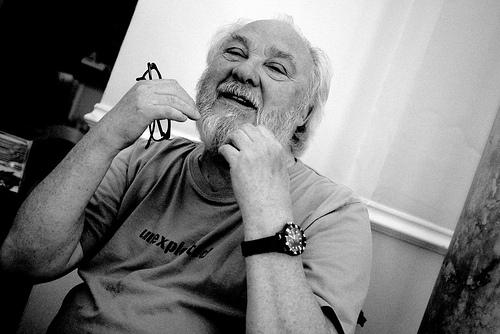domingo, dezembro 30, 2018
Patti Smith faz hoje 72 anos
Postado por
Fernando Martins
às
07:20
0
bocas
![]()
Marcadores: art rock, Because the Night, música, Patti Smith, poesia, Protopunk, punk, punk rock
Paiva Couceiro nasceu há 157 anos
Postado por
Fernando Martins
às
01:57
0
bocas
![]()
Marcadores: Angola, Integralismo Lusitano, Moçambique, Monarquia, Monarquia Constitucional, Monarquia do Norte, Paiva Couceiro
sábado, dezembro 29, 2018
Jon Voight - oitenta anos!
Postado por
Fernando Martins
às
08:00
0
bocas
![]()
Marcadores: actor, cinema, Jon Voight
Portinari nasceu há 115 anos
sexta-feira, dezembro 28, 2018
O sismo de Messina foi há 110 anos
Quake
Relief efforts
News of the disaster was carried by Italian torpedo boats to Nicotera, where the telegraph lines were still working, but that was not accomplished until midnight at the end of the day. Rail lines in the area had been destroyed, often along with the railway stations.
The Italian navy and army responded and began searching, treating the injured, and evacuating refugees (as did every ship). Looters soon had to be shot. King Victor Emmanuel III and the Queen arrived.
The disaster made headlines worldwide and international relief efforts were launched. With the help of the Red Cross and sailors of the Russian and British fleets, search and cleanup were expedited. The Russian battleships Tsesarevich, and Slava and the cruisers Admiral Makarov, and Bogatyr, British battleship Exmouth and the cruisers Euryalus, Minerva, and Sutlej were ordered to provide assistance; the S.S. Afonwen was in Messina harbor during the quake (anchored in 45 fathoms (80 m) of water, but there were only 30 fathoms (55 m) when she sailed full of refugees). The French battleships Justice and Vérité, and three torpedo boat destroyers were ordered to Messina. The U.S. Navy's Great White Fleet and supply ships USS Celtic and USS Culgoa were also ordered to assist. Other nations' ships also responded.
In the years following 1908, precautions were taken when reconstruction began, building architecture that would be able to withstand earthquakes of variable magnitude, if one should strike again. In the midst of reconstruction many of the Italian residents were relocated to various parts of Italy. Others were forced to emigrate to America. In 1909 the cargo ship Florida carried 850 such passengers away from Naples. Lost in a dense fog, the Florida collided with the Republic, a luxury passenger liner. Three people aboard the Florida were killed instantly. Within minutes, pandemonium broke out on the ship. The captain of the Florida, Angelo Ruspini, used extreme measures to regain control of the desperate passengers, including firing gunshots into the air. Eventually the survivors were rescued at sea and brought into the New York harbor where they would start a new life.
Postado por
Fernando Martins
às
01:10
0
bocas
![]()
Marcadores: 28 de dezembro de 1908, Itália, Messina, Reggio di Calabria, Sícilia, sismo, sismologia, tsunami
O poeta Olavo Bilac morreu há um século
Bilac foi jornalista, poeta, frequentador de rodas de boémias e literárias no meio letrado do Rio de Janeiro. Sua projeção como jornalista e poeta e seu contacto com intelectuais e políticos da época conduziram-no a um cargo público: o de inspetor escolar. A se considerar a importância dada aos cargos escolares naquele período, principalmente aquele de professor da Escola Pedro II (onde diversos eruditos disputaram famosas preleções para cargo professoral, como Euclides da Cunha e Astrojildo Pereira), não é de somenos importância perceber o relevo social desta profissão naquele meio. Aliás, sua participação na vida quotidiana e cultural foi uma marca patente em sua imagem: sabe-se, por exemplo, que em 1897 Bilac acabou perdendo o controle do seu automóvel Serpollet e o bateu contra uma árvore na Estrada da Tijuca, no Rio de Janeiro - RJ, sendo o primeiro motorista a sofrer um acidente de carro no Brasil.
Aos poucos profissionaliza-se: produz, além de poemas, textos publicitários, crónicas, livros escolares e poesias satíricas. Visava, então, contar através de seus manuscritos a realidade presente na sua época. Prestou colaboração em publicações periódicas como as revistas: A Imprensa (1885-1891), A Leitura (1894-1896), Branco e Negro (1896-1898), Brasil-Portugal (1899-1914), Azulejos (1907-1909) e Atlântida (1915-1920). Sua estreia como poeta, nos jornais cariocas, ocorreu com a publicação do soneto "Sesta de Nero" no jornal Gazeta de Notícias, em agosto de 1884. Recebeu comentários elogiosos de Artur Azevedo, precedendo dois outros sonetos seus, no Diário de Notícias. Ademais, escreveu diversos livros escolares, ora sozinho, ora em co-autoria com seus amigos Coelho Neto e Manuel Bonfim.
m 1891, com a dissolução do parlamento e a posse de Floriano Peixoto, inúmeros intelectuais perdem seu protetor, o dr. Portela, ligado ao primeiro presidente republicano Deodoro da Fonseca. Como reação, o escritor participa da fundação d'O Combate, órgão antiflorianista e opositor do estado de sítio declarado pelo marechal Floriano Peixoto após a ameaça de novo golpe político contra a ainda instável república, quando então o primeiro é preso e constrangido a passar quatro meses detido na Fortaleza da Laje, no Rio de Janeiro.
O grande amor de Bilac foi Amélia de Oliveira, irmã do poeta Alberto de Oliveira. Chegaram a ficar noivos, mas o compromisso foi desfeito por oposição de outro irmão da noiva, desconfiado de que o poeta era um homem arruinado. Seu segundo noivado fora ainda menos duradouro, com Maria Selika, filha do violonista Francisco Pereira da Costa. Viveu sozinho, em consequência destes descasos amorosos, sem constituir família até o fim de seus dias. Decorrido seu falecimento, em 28 de dezembro de 1918, fora sepultado no Cemitério de São João Batista no Rio de Janeiro.
Última flor do Lácio, inculta e bela,
És, a um tempo, esplendor e sepultura:
Ouro nativo, que na ganga impura
A bruta mina entre os cascalhos vela…
Amo-te assim, desconhecida e obscura,
Tuba de alto clangor, lira singela,
Que tens o trom e o silvo da procela
E o arrolo da saudade e da ternura!
Amo o teu viço agreste e o teu aroma
De virgens selvas e de oceano largo!
Amo-te, ó rude e doloroso idioma,
Em que da voz materna ouvi: "meu filho!"
E em que Camões chorou, no exílio amargo,
O génio sem ventura e o amor sem brilho!
Olavo Bilac
Postado por
Fernando Martins
às
01:00
0
bocas
![]()
Marcadores: Brasil, Olavo Bilac, parnasianos, poesia, Português
Paul Hindemith morreu há 55 anos
Postado por
Fernando Martins
às
00:55
0
bocas
![]()
Marcadores: modernismo, música, Paul Hindemith, violino
O Arquipélago de Gulag foi publicado há 45 anos...
| “ | Dedico este livro a todos quantos a vida não chegou para o relatar. Que eles me perdoem por não ter visto tudo, por não ter recordado tudo, por não me ter apercebido de tudo. | ” |
| “ | Kolima era a maior e a mais célebre ilha, o pólo de ferocidade desse assombroso Arquipélago de GULAG, desgarrado pela geografia num arquipélago, mas psicologicamente ligado ao continente, a esse quase invisível, quase intangível país habitado pelo povo zek. | ” |
The KGB seized one of only three extant copies of the text still on Soviet soil. This was achieved by torturing Elizaveta Voronyanskaya, Solzhenitsyn's typist who knew where the typed copy was hidden; within days of her release by the KGB, she hanged herself on 3 August 1973.
Translated into English by American Thomas Whitney, the English and French translations of Volume I appeared in the spring and summer of 1974. Solzhenitsyn had been in touch with them about the upcoming publication, which he knew he could not put off much longer, but the final decision was taken by the YMCA Press itself with the author's implicit approval (two years previously, it had published August 1914).
Solzhenitsyn had wanted the manuscript to be published in Russia first, but knew this was impossible under conditions then extant. The international impact of the work was profound. Not only did it provoke a very vivid debate in the West, a mere six weeks after the work had left Parisian presses Solzhenitsyn himself was forced into exile.
Because possession of the manuscript incurred the risk of a long prison sentence for 'anti-Soviet activities', Solzhenitsyn never worked on the manuscript in complete form. Due to the KGB's constant surveillance of him, Solzhenitsyn only worked on parts of the manuscript at any one time, so as not to put the book as a whole into jeopardy if he happened to be arrested. For this reason, he secreted the various parts of the work throughout Moscow and the surrounding suburbs, in the care of trusted friends, and sometimes purportedly visiting them on social calls, but actually working on the manuscript in their homes. During much of this time, Solzhenitsyn lived at the dacha of the world-famous cellist Mstislav Rostropovich, and due to the reputation and standing of the musician, even with Soviet authorities, he was reasonably safe from KGB searches there.
Solzhenitsyn did not think this series would be his defining work, as he considered it journalism and history rather than high literature. However, with the possible exception of One Day in the Life of Ivan Denisovich, it is his best-known and most popular work, at least in the West.
Finished in 1968, The Gulag Archipelago was microfilmed and smuggled out to Solzhenitsyn's main legal representative, Dr Kurt Heeb of Zürich, to await publication (a later paper copy, also smuggled out, was signed by Heinrich Böll at the foot of each page to prove against possible accusations of a falsified work).
Solzhenitsyn was aware that there was a wealth of material and perspectives that merited to be continued in the future, but he considered the book finished for his part. The royalties and sales income for the novel were transferred to the Solzhenitsyn Foundation for aid to former camp prisoners, and this fund, which had to work in secret in its native country, managed to transfer substantial amounts of money to those ends in the 1970s and 1980s.
Postado por
Fernando Martins
às
00:45
0
bocas
![]()
Marcadores: Arquipélago de Gulag, comunismo, direitos humanos, Estaline, estalinismo, fome, gulags, KGB, literatura, Prémio Nobel, Soljenítsin, terror, tortura, URSS
O cantor John Legend faz hoje quarenta anos!
Em dezembro de 2011 começou a namorar a modelo Chrissy Teigen. Eles casaram no dia 14 de setembro de 2013, em Como, Itália. A música All of me foi escrita especialmente para a esposa.
Postado por
Fernando Martins
às
00:40
0
bocas
![]()
Marcadores: All of me, John Legend, Lindsey Stirling, Ludacris, música, pop, Rhythm and Blues, soul
quinta-feira, dezembro 27, 2018
Hayley Williams, vocalista dos Paramore, fez hoje trinta anos
| Eu achei a borboleta na rua da minha mãe há algum tempo atrás… morta e completamente intacta. |
- Hayley Williams
|
Postado por
Fernando Martins
às
23:30
0
bocas
![]()
Marcadores: Misery Business, música, Paramore, Rock, Rock alternativo
Benazir Bhutto foi assassinada há onze anos
Postado por
Fernando Martins
às
11:00
0
bocas
![]()
Marcadores: Al-Qaeda, assassinato, Benazir Bhutto, Paquistão, Partido Popular do Paquistão, terrorismo
Eiffel morreu há 95 anos
- Galeria das Máquinas para a Exposição Universal de Paris (1867).
- Viaduto de Garabit, sobre o rio Truyère, no sul de França, considerada a ponte mais alta do mundo, à época, com 120 metros de altura.
- Cúpula do observatório de Nice.
- Ponte de D. Maria Pia na cidade do Porto (1876).
- Ponte dupla de Viana do Castelo em Portugal (1877).
- Ponte de Triana em Sevilha, Espanha.
- Palácio de Ferro em Luanda, Angola.
- Casa de Ferro em Maputo, Moçambique.
- Mercado Municipal em Olhão, Portugal.
- Ponte Ferroviária em Barcelos, Portugal.
- Ponte Rodoviária em Pinhão, Portugal.
- Farol de São Tomé em Campos dos Goytacazes, Brasil.
- Catedral metálica de Arica, Chile.
Postado por
Fernando Martins
às
09:50
0
bocas
![]()
Marcadores: Eiffel, engenharia, Estátua da Liberdade, Gustave Eiffel, Torre Eiffel
O poeta e compositor Peter Sinfield faz hoje 75 anos!
Epitaph - King Crimson
The wall on which the prophets wrote
Is cracking at the seams.
Upon the instruments of death
The sunlight brightly gleams.
When every man is torn apart
With nightmares and with dreams,
Will no one lay the laurel wreath
When silence drowns the screams.
Confusion will be my epitaph.
As I crawl a cracked and broken path
If we make it we can all sit back
and laugh.
But I fear tomorrow I'll be crying,
Yes I fear tomorrow I'll be crying.
Between the iron gates of fate,
The seeds of time were sown,
And watered by the deeds of those
Who know and who are known;
Knowledge is a deadly friend
If no one sets the rules.
The fate of all mankind I see
Is in the hands of fools.
Confusion will be my epitaph.
As I crawl a cracked and broken path
If we make it we can all sit back
and laugh.
But I fear tomorrow I'll be crying,
Yes I fear tomorrow I'll be crying.
Postado por
Fernando Martins
às
07:50
0
bocas
![]()
Marcadores: Emerson, Epitaph, King Crimson, Lake and Palmer, letrista, poesia, Rock Progressivo, Roxy Music













